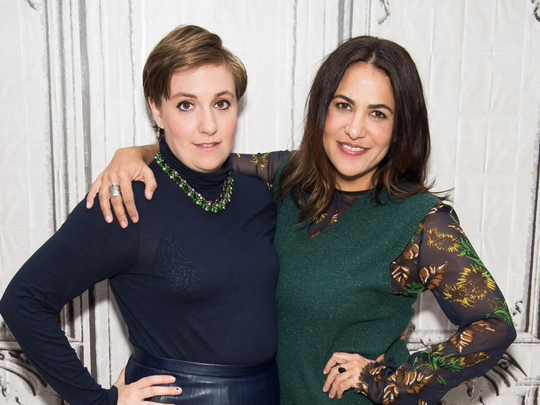
“Lenny Letter” is doing something exceptional — but also exceptionally old-fashioned.
The feminist arts newsletter, created by Girls star Lena Dunham and her writing partner Jenni Konner, isn’t just sharing links and photos and GIFs, as a million popular personal newsletters have before. Instead, it has in-depth interviews with the likes of Chenai Okammor, a dear friend of Sandra Bland; original fiction by writer Jenny Zhang and Dunham herself; and even an activist call to action: “Why You Should #AskYourMother About Life Before Roe”.
All are original pieces of content, and are shared exclusively in the once-archaic e-mail newsletter format.
Almost like a website — but also (very deliberately) not.
“When it is read in the e-mail newsletter format, it’s so much cleaner, and the images and the words — it’s almost a throwback to reading magazines,” said Jessica Grose, the editor at “Lenny Letter”. “We want that kind of experience. We want the individual experience.”
Newsletters have been enjoying something of a renaissance lately. Velvet-voiced podcasters drop endorsements for “TinyLetter”; podcast ad has become its own meme for “MailChimp”; and artists, writers and musicians have signed up for their own newsletters in droves.
Where the first generation of personal newsletters might have been big on curation and self-promotion, projects like Dunham’s are beginning to stretch the genre in new directions, suggesting the lowly newsletter can be an upstart news platform, an open diary — even a form of art.
There’s Laura Olin’s “Everything Changes”, which literally changes formats with each edition; “Pep Talk”, which consists of a single GIF; the experimental “Hello Prompt”, which invites subscribers to send in short pieces of writing, making it less a broadcast than a communal writing project. Charlotte Shane’s Prostitute Laundry has chronicled, diary-like, her feelings on her relationships and her sex life (Shane, understandably, is a pseudonym). A recent issue includes 3,000-plus words ruminating on a trip to California, a conversation with an ex and a quote from French writer Hélène Cixous.
There has, of course, always been something slightly subversive about the personal newsletter — at least in its current wave. Interviewed by The Guardian in March, the culture writer Durga Chew-Bose argued that newsletters are often a fundamentally feminist project, a way for women to avoid “public appraisal” and return “to a culture of correspondence”, prefaced on community.
Sponsorships are an option for some high-profile writers (Olin partnered with the Awl earlier this year). Advertising is also a possibility, but many independent producers don’t have the resources to contract it; and even if they did, newsletters — much like podcasts — tend to make traditional advertisers skittish.
What will keep the lights on at Lenny? It’s a little too soon to say. The newsletter has signed on a full-time staff of three, so it will have to figure that out eventually. Dunham has hinted at some kind of e-commerce aspect, collaborating with “independent female artists and designers”.
“We have been lucky, as creators and as women, to have had our voices heard,” the inaugural issue reads. “We wanted to create a space where new voices were safe to speak loudly.”
When you think about it, that’s kind of a radical idea: an e-mail, of all possible things, leveraged as a platform for empowerment and community.
— Los Angeles Times












